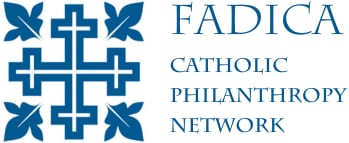Los Angeles – – Mother M. Clare Millea, ASCJ, Apostolic Visitator for the Vatican’s Congregation on Religious Life, told thirty-five members of FADICA gathered here on May 13-14, 2010, that the current examination of apostolic communities of women religious in the U.S. is more a process of self evaluation, reflection and affirmation than a probe of misconduct.
“Nothing is forced,” Mother Millea said, “it’s all by invitation,” the sister reported.
Speaking of the first phase of the process, which consisted of the circulation of prepared questionnaires, supplemented by face-to-face listening sessions, Mother Millea said: “I came in, I had no agenda. I just asked the religious to tell me their story, their hopes, their joys, their concerns.”
The current third phase of the listening process has enlisted 78 religious who are helping Mother Millea gather interviews from about 85 U.S. congregations of women religious.
“We’re getting some excellent feedback from the onsite visits,” she said.
According to Mother Millea the process has been divided into four stages. The first two involved data gathering on 341 congregations.
Some 78% of U.S. congregations provided the requested information, which Mother Millea said was “a wonderful statistic for a step in the process which is voluntary.”
This current third phase of the inquiry, according to Mother Millea, will conclude this December, followed by the composition of a report to the Congregation on Religious Life based on data gathered, interviews and input from the communities.
When pressed by members of FADICA as to her hopes and concerns for the process, Mother Clare spoke with some degree of fervor about the declining numbers of vocations.
“People ask what the hidden agenda is,” Mother Millea said, “I don’t see one. What I do see is that the church is concerned about the diminishing number of sisters,” she added.
Mother Millea cited research on American congregations finding that there are more women religious over 90 years of age than women religious under age 60. “That is frightening”, she told FADICA.
When asked about expected outcomes of the whole visitation, Mother Millea replied, “new life … and renewed avenues of communication which would increase community among ourselves (as religious) and other components in the church,” she said.
According to FADICA President, Dr. Francis J. Butler, the discussion with Mother Millea formed part of an ongoing series of FADICA conferences this year focused on the philanthropy and leadership of women religious.
Following Mother Millea’s presentation, FADICA co-sponsored a discussion with the Conrad N. Hilton Fund for Sisters, focusing on the international ministries of sisters at the United Nations, and in the fields of sustainable agriculture and humanitarian aid in Haiti.
This fall, FADICA will continue the series with a look at the work of women religious in the home mission dioceses of the United States. The conference will be co-sponsored with the Catholic Church Extension Society.
Speaking in behalf of the gathered FADICA members, Dr. Butler told Mother Millea that throughout FADICA’s thirty-five year history “religious women have been front and center in the common interest of our foundations.”
“We want to be as supportive as we can be to religious women in the U.S. at this time,” Dr. Butler added.


